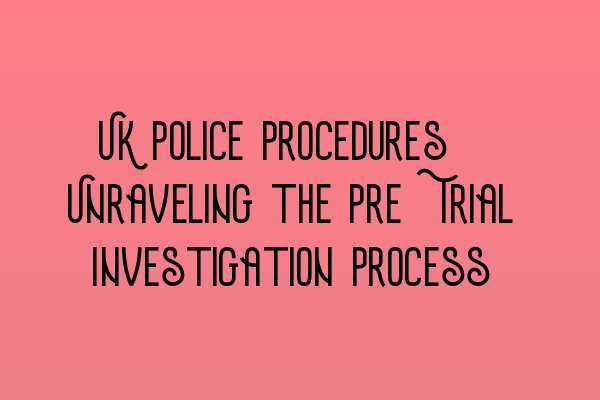UK Police Procedures: Unraveling the Pre-Trial Investigation Process
When it comes to criminal cases in the UK, the pre-trial investigation process plays a crucial role. Understanding the various police procedures involved can give you valuable insights and help you navigate the legal system effectively. In this article, we will delve into the key aspects of the pre-trial investigation process and shed light on its significance.
What is the Pre-Trial Investigation Process?
The pre-trial investigation process refers to the period of time before a criminal trial begins. It involves the collection and analysis of evidence by the police and other law enforcement agencies to establish the guilt or innocence of the accused. The goal is to gather enough evidence to present a strong case before the court.
During this process, the police carry out various investigative procedures, including interviewing witnesses, examining crime scenes, conducting forensic tests, and gathering CCTV footage. These procedures are conducted meticulously to ensure a fair and thorough investigation.
The Role of the Police in the Pre-Trial Investigation Process
The police play a crucial role in the pre-trial investigation process. They are responsible for initiating and conducting the investigation, ensuring that all necessary evidence is collected, and identifying potential suspects. The police also work closely with other agencies, such as forensic experts and legal professionals, to strengthen their case.
One of the key procedures undertaken by the police is the identification and interview of witnesses. Witnesses provide essential information and testimony that can either support or challenge the prosecution’s case. The police employ various techniques, such as witness interviews, statements, and line-ups, to gather accurate and reliable evidence.
Another important aspect of the pre-trial investigation process is the examination of crime scenes. This involves collecting physical evidence, documenting the scene through photographs or sketches, and ensuring the chain of custody is maintained. Crime scene investigation requires meticulous attention to detail to preserve and collect any potential evidence that may be presented in court.
The Significance of Proper Pre-Trial Investigation
A thorough pre-trial investigation is vital to ensure a fair trial and uphold the principles of justice. It helps in establishing the truth, identifying the guilty party, and protecting the rights of the accused. A robust investigation also assists in building a strong case, increasing the chances of a successful prosecution.
Furthermore, a well-conducted pre-trial investigation can help expedite the legal process by ensuring that all necessary evidence is obtained at an early stage. This saves valuable time and resources, benefitting both the prosecution and the defense.
Conclusion
Understanding the pre-trial investigation process is essential for anyone involved in the criminal justice system. It provides insights into the procedures followed by the police and helps individuals navigate the legal system effectively. By familiarizing yourself with the nuances of the investigation process, you can make informed decisions and protect your rights during a criminal trial.
To learn more about legal practice in the UK, prepare for the SQE exams, or explore relevant courses, you can visit our related articles:
- SQE 1 Practice Exam Questions
- SQE 1 Practice Mocks FLK1 FLK2
- SQE 2 Preparation Courses
- SQE 1 Preparation Courses
- SRA SQE Exam Dates
Feel free to explore these resources to enhance your legal knowledge and stay up to date with the latest developments in the field.
